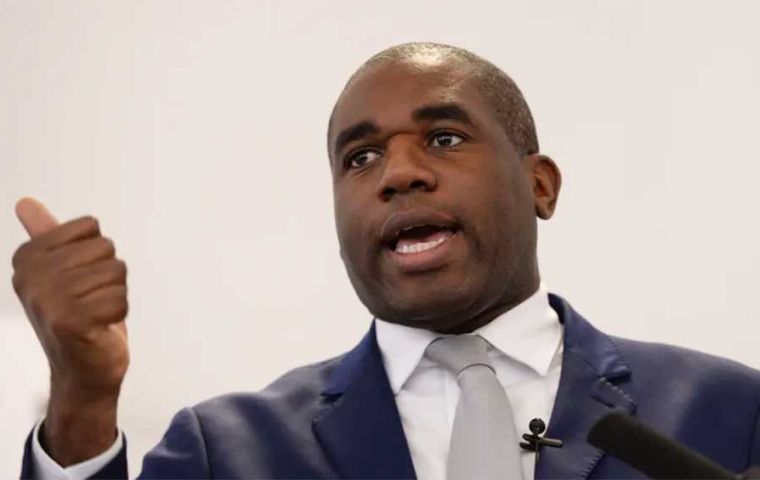MercoPress. South Atlantic News Agency
Lammy says money reparations would be a simplistic way out
 Lammy said Britain is pursuing a new approach to relations with African nations
Lammy said Britain is pursuing a new approach to relations with African nations British Foreign Secretary David Lammy said Monday in Lagos, Nigeria, that the so-called “slave reparations” called for by many former colonies were not about the “transfer of cash,” which would be a “simplistic press debate.” He argued instead that there were other ways in which 21st-century Britain could address the impact of such a “horrific and horrendous” practice of yesteryear, such as better trade relations with African countries.
Lammy, who is visiting Nigeria and South Africa this week, said Britain is pursuing a new approach to relations with African nations that will deliver on “respectful partnerships that listen rather than tell, deliver long-term growth rather than short-term solutions, and build a freer, safer, more prosperous continent.”
Many participants at the recent 27th Commonwealth Heads of Government Summit in Samoa agreed on the need for a “meaningful, respectful and truthful” discussion of reparatory justice for the transatlantic slave trade and the “scars” it has left.
“I am the descendant of enslaved people, so I recognize that,” Lammy admitted. He is a child of Guyanese immigrants to the UK. British authorities had brought over many African and Indian slaves and indentured servants into the former colony on the South American mainland.
Lammy also told the BBC that reparations are “not about the transfer of cash,” especially under this cost-of-living crisis in the UK. Instead, he argued, developing nations could benefit from the transfer of British scientific and technical expertise.
Prime Minister Keir Starmer’s cabinet at 10 Downing Street has previously ruled out both cash payments and “other forms of non-financial reparatory justice” as well. “We do not pay reparations,” a spokesman for Starmer said last month, adding that London will not be offering an apology for slavery either.
Britain first got involved in trading slaves from Africa to the Americas in 1562, becoming the world’s largest slave trafficker by the 1730s. In the 19th century, London reversed course, however, banning the slave trade in 1807 and abolishing slavery in the colonies in 1833.
At the recent Commonwealth summit, King Charles III argued that the past could not be changed. He also insisted on finding the “right language” and an understanding of history “to guide us towards making the right choices in a future where inequality exists.”




Top Comments
Disclaimer & comment rules-

-

Read all commentsSlavery has been around 1000s of years, where do you start ? where does it end ? , should Britain get compensation from Italy when the Romans enslaved us, 100s of nations have been affected and involved, its all crap, just a money grifting game,
Nov 05th, 2024 - 01:02 pm +1And did this guy point out to his Nigerian Hosts that their ancestors also had the blood of slavery on their hands as several of their ancestors made a lot of gold and silver out of raiding their fellow neighbouring tribes and selling them to the slavers.
Nov 05th, 2024 - 12:27 pm 0Commenting for this story is now closed.
If you have a Facebook account, become a fan and comment on our Facebook Page!